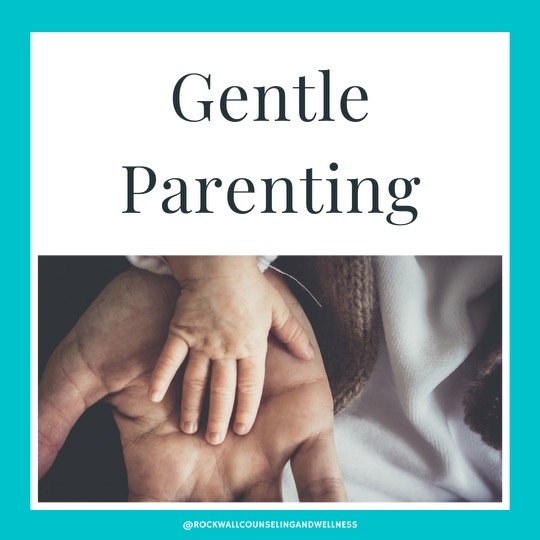Lately online you may have seen a “new trend” in parenting that’s gotten a lot of attention. “Gentle parenting” or “responsive parenting” is not necessarily new in the sense that it’s based on child development research from over 50 years ago. However, it is making the rounds on parenting blogs, social media and other outlets. The term “gentle parenting” may conjure up scenarios in your mind of parents being bulldozed by tantrum-throwing toddlers, but in reality, it is much different than this, and if your child is struggling with tantrums, following instructions, or decision making, gentle parenting could be an approach that helps your family dynamic.
What is gentle parenting?
According to the Cleveland Clinic, gentle parenting is a parenting style in which the goal is to raise children to be independent, respectful, and confident by focusing on empathy, respect, and healthy boundaries. Gentle parenting has three main components: developmentally appropriate emotional coaching, prioritizing empathy over reward/punishment, and intentional parent responses.
Gentle parenting focuses a great deal on building empathy. If your child can understand why you have certain expectations for him or her, they’re more likely to follow instructions and have a healthy respect for you, rather than obedience based only on fear. For example, if your daughter is throwing a tantrum when you need her to put on her shoes, the traditional parenting approach, or even just instinct, might be to raise your voice and say, “Put your shoes on right now! Don’t you understand we’re going to be late?!” And the truth is, your child likely doesn’t understand the anxiety it causes you to be late. Nor do they grasp that their actions, throwing a tantrum and refusing to put on shoes, is upsetting to you. They may listen to shouting or demands, but it ultimately is only a response out of fear. Gentle parenting takes more time. In the same situation, parents practicing a gentle parenting style would prepare the child ahead of time, explaining why it is important to be on time and setting clear expectations of what should happen when you get ready to leave the house.
Gentle parenting is similar to coaching in that with a gentle approach, parents work with their children to help them identify their emotions and come up with a plan for when big feelings arise. Children are learning how to be people. Just as they must have models for how to tie their shoes, ride a bike, or throw a ball, they must also have models for how to deal with emotions. For example, if your teenager is talking back and taking a poor attitude with you, there is likely a bigger reason. Rather than matching their shouting or rude language, or simply punishing the teen, gentle parenting helps the child process his own emotions while still setting clear boundaries. It might sound something like, “I can tell that you’re really upset by whatever happened at practice today, and that’s okay. I’m going to give you some space if you’d like, and then we can talk about why you felt so overwhelmed.” Then when they’ve had time to cool down, reminding them that their emotions are not an excuse for being unkind or disrespectful and that there are consequences for when they do this.
What is gentle parenting NOT?
Gentle parenting is often mistaken for or incorrectly labeled “permissive parenting,” but gentle parenting does not excuse or allow behaviors. Rather, it helps children understand why some behaviors are not allowed. Being a “gentle parent” doesn’t mean you have to be your kid’s buddy or that you’ll have unruly children. Gentle parents still have consequences for their children. But rather than “Because I said so” type logic for punishments, parents can explain the consequence as a result of a boundary or rule violation. When parents are clear with their communication, punishments make sense to kids as a result of their own choices rather than arbitrarily decided by parents.
Gentle parenting is also not helicopter parenting. While gentle parents do work closely with their children to help them understand and process their own emotions, they do not do this work for them. They don’t keep children from making mistakes but rather, help children realize that mistakes and failures are part of life, and that they are not defined by mistakes.
So what if I want to become a gentler parent?
Gentle parenting is time consuming, and it does require that parents themselves be emotionally healthy and have worked to heal from past trauma that might affect the way they parent. It also requires that parents are conscientious of what triggers an unhealthy emotional response in themselves and be able to step back and interact with their children from a calm space rather than a reactive one. However, it can also strengthen relationships amongst your family members and bring more calm to your household. If you feel you need help with this or other parenting topics, check the link below to connect with one of our counselors in Rockwall or Heath who specialize in family counseling and parenting.
Written by Emily Taylor, Contributing Writer

